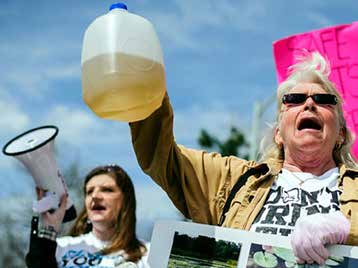Flint water crisis, through the eyes of older adults
An older perspective on Flint's water woes
For three years, Flint, MI, has been in the stranglehold of a water crisis. Dangerously high levels of lead and other contaminants leached into the public water supply, forcing residents to drink, cook with and sometimes bathe in bottled water. The impact of this environmental catastrophe is closely studied, especially in young children whose lead exposure can cause developmental and cognitive deficits.
 At the other end of the lifespan, residents 50 and older, the impact is not as well understood. "What does this mean to older adults?" asked Jessica Robbins-Ruszkowski, Ph.D., a researcher on social aging, jointly appointed to the IOG and the Department of Anthropology.
At the other end of the lifespan, residents 50 and older, the impact is not as well understood. "What does this mean to older adults?" asked Jessica Robbins-Ruszkowski, Ph.D., a researcher on social aging, jointly appointed to the IOG and the Department of Anthropology.
"How do they understand it in relation to their lives today and in the future?" She and co-investigator Tam Perry, Ph.D., of the School of Social Work, approach the situation as qualitative researchers. They don't collect blood samples or run cognitive tests.
"We talk to people," Dr. Robbins-Ruszkowski said. "We try to build long-term, trusting relationships with participants over time, through interviews and observations. We might cook a meal with people, or go with them to pick up water or to contest a water bill. We encourage them to tell us - and show us - their story." This approach is ethnographic, a way of examining and interpreting the lived realities of different people.
The value of ethnography lies in its depth rather than the number of participants. The team plans to recruit local residents age 50+, or self-identified as "older" or "senior," and conduct three in-person, one to two hour interviews with each, spaced equally across 18 months.
Cameras will also be available for participants to photograph what the water crisis and aging look like to them. The researchers are exploring the possibility of displaying these photos at a public exhibit in Flint – with participants' permission – and publishing a book for wider dissemination.
Bathing in bottled water
Drs. Robbins-Ruszkowski and Perry, and WSU postdoctoral fellow Kimberly Seibel, Ph.D., have conducted nine interviews so far. One person had no safe drinking water in her home, no easy way to get any, and was planning to drink tap water (the team brought her a few cases of water after the interview).
A grandparent talked about the scheduling challenges of protecting her grandchildren from skin rashes by driving them outside Flint every other day to shower. An older woman fills a smaller, bag-like container inside her tub with bottled water to bathe her grandson.
We don't know exactly where the research will take us. We let the interviews reveal next steps as people talk about what matters to them.
"Older Flint residents have been through a lot in their lifetimes," Dr. Robbins-Ruszkowski said. "This is not Flint's first case of structural violence. There were economic troubles when the GM plant closed in 1997. There's been segregation, discrimination, and mistrust of the government."
The research aims to connect historical memory to the current challenges. "We don't know exactly where the research will take us. We let the interviews reveal next steps as people talk about what matters to them." The team is careful to be sensitive to fears, concerns and privacy. Flint residents, in the public eye for several years, are at risk of feeling over-studied yet under-helped. "Seniors, though, tell us no one is focusing on them.
No one is paying attention to their needs." How does lead-tainted water affect late-life cognition, social isolation, and other diseases? "We can't get a full understanding of any topic unless we include people across the age spectrum," Dr. Robbins-Ruszkowski said.
The Flint project is part of the Flint Area Community Health and Environment Partnership (FACHEP), a multi-institutional team of environmental engineering and public health experts led by WSU researchers Drs. Paul Kilgore and Shawn McElmurry, studying possible associations between changes in Flint's water system and public health, especially the recent Legionnaire's disease outbreak. Dr. Robbins-Ruszkowksi's garden research is supported by a grant from the National Institutes of Health (P30 AG015281).
Dr. Robbins-Ruszkowski's research in both Flint and Detroit are featured in the Winter 2017 Newsletter of the Institute of Gerontology.